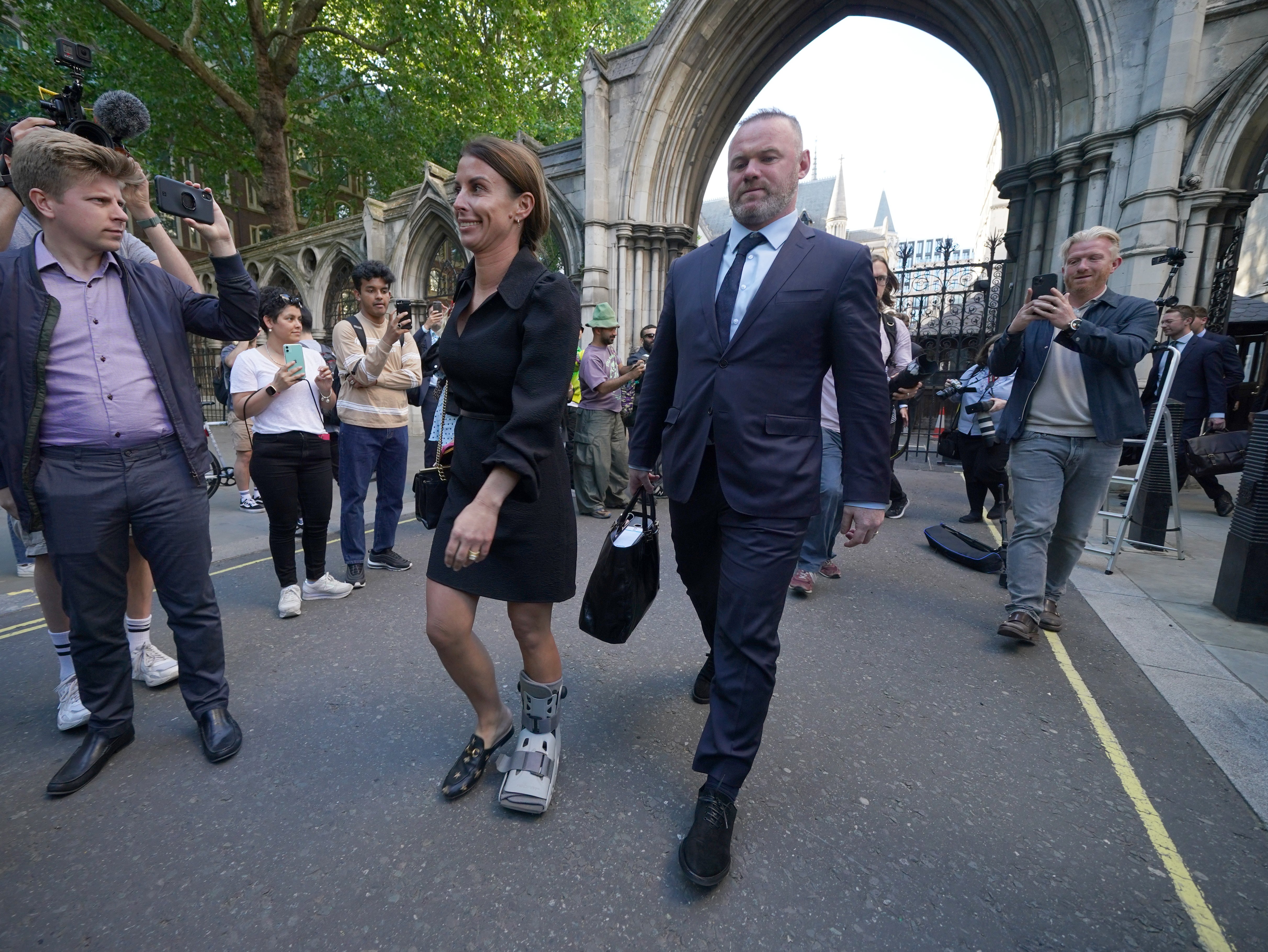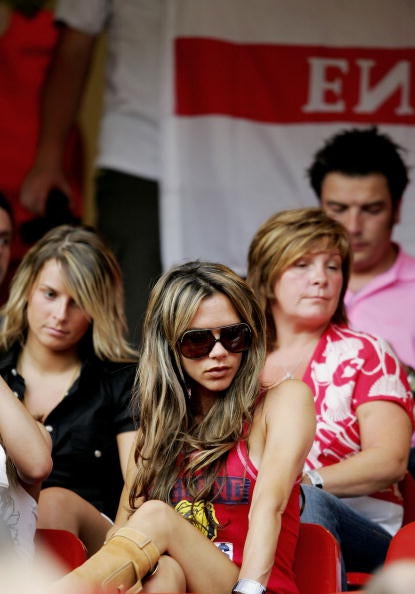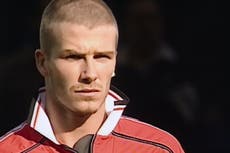Britain’s most famous Wags are finally being taken seriously – but why did it take so long?
At the peak of Wag mania, Victoria Beckham and Coleen Rooney overcame streaky highlights, sexist fan chants and false claims they were just fake (tanned) hangers-on, writes Amanda Whiting. But two new documentaries prove that they were the true stars of their marriages all along


At the 2006 World Cup in Germany, England faced Trinidad and Tobago in a forgettable group-stage match in Nuremberg. It was scoreless until the final 10 minutes, but I only remember the tabloid images from the day: glossy photos of young, glamorous women smiling in the stands.
It was 26 degrees, and Coleen Rooney (not yet her last name), Cheryl Cole (not yet – nor presently – her last name), and Mrs Victoria Beckham were supporting their Habs Wayne, Ashley and David on the pitch. As befitted the weather, the women’s shorts were short and tops shrunken. As befitted the times, their highlights were streaky; their manicures French; their tans fake.
On rest days, the Wags shopped. In the evenings, they put on mini-dresses and sauntered the streets of Baden-Baden in formation, like they were shooting an album cover. I remember the papers always made sure to refer to England’s base in the Black Forest as a “spa town,” as though the Wags themselves had bribed Fifa officials to ensure the team trained there. The golden generation flamed out of the tournament, losing to Portugal on penalties in the quarter-finals. But by the time the squad landed back in England, it was the “hooligans with credit cards” – to borrow a sexist, classist dig from the time – who were being scapegoated.
It was a different era in the history of Wags. The affectionately pointed nickname for wives and girlfriends wasn’t even in common usage yet, and social media was in its infancy. We relied on tabloids to anoint our celebs for us, to give us glimpses of their “real” lives. Victoria and Cheryl were famous pop stars, and Coleen McLoughlin was the childhood sweetheart of Wayne Rooney – the most promising English footballer since, well, David Beckham. Whether you were shipping them or vilifying them, you were talking about them. At the following World Cup, the then England manager Fabio Capello instituted a soft ban on the Wags. And despite an even worse result in South Africa in 2010 than in Germany, Roy Hodgson did the same in 2014. (His England team didn’t make it out of the group stages.)
If only those managers could have seen an advance cut of Beckham, the new four-part Netflix documentary about the former Manchester United star that pays particular attention to his marriage to Posh Spice. Or the forthcoming Disney+ doc Coleen Rooney: The Real Wagatha Story, from the producer/director of the Bafta-winning Channel 4 series One Born Every Minute and the production company behind last year’s sympathetic Pamela Anderson film. They’d have known what an asset they were benching when they banished the Wag Class of ’06 from the stands – women who, now in their thirties and forties, are orchestrating their own media redemptions.
Because, over the decades, Posh and Coleen have been reduced to a carousel of footballer’s wife caricatures. When their husbands took jobs far from England, for example, the media rewrote them into snobbish and ungrateful trailing spouses. Provincial Victoria was said to think Spain “smelled like garlic” after David’s 2003 transfer to Real Madrid. (She delayed her family’s move to the continent to research schools for her kids, she says in Beckham.) When Wayne decided to finish his playing career in Washington, DC, headlines touted that homesick Coleen “hated” America. (Her worst criticism on public record is that there were “hardly any soft plays” for her sons.)
If Victoria and Coleen have anything in common beyond the hours logged at Old Trafford, it’s that they’re both tough as nails
When the Beckham and Rooney marriages were troubled with allegations of affairs, the media played a more doleful tune on the Wags’ behalf. No longer were these women ungracious and uncosmopolitan; for now, Victoria and Coleen were being treated to a hollow kind of pity. “Coleen Rooney’s tears over new cheating scandal” and “Posh: How her world fell apart”. Headlines acknowledged that these women had private emotional lives even if the existence of prying gossip stories betrayed how little consideration those emotional lives would be given.
But what’s emerging now, from their new streaming series and even Coleen’s libel trial, are portraits that frankly make a lot more sense than the tabloid versions that have circulated for years. If Victoria and Coleen have anything in common beyond the hours logged at Old Trafford, it’s that they’re both tough as nails and far more quiet and self-serious than the paparazzi have ever bothered or managed to capture.
Take Coleen Rooney, who, yes, did use Instagram to publicly accuse fellow Wag Rebekah Vardy – wife to Jamie – of leaking stories about her to the press. She was hardly keeping a low profile at that moment, but it was the Poirot-esque methodology she used to ferret out Rebekah – Coleen would feed false stories to Rebekah’s account alone and wait for them to appear in the next day’s papers – that was so captivating. And if it wasn’t for Rebekah’s libel lawsuit against Coleen, our window into Mrs Rooney might have ended there. “I don’t want to be here, but Mrs Vardy brought me here,” Coleen told a judge last year.

And “here” is the Royal Courts of Justice, the unlikely place where Coleen’s image got rehabbed – against her will perhaps, but not without her help. Before the trial, I could only picture Coleen as the gossip rags presented her. Which is to say, until she turned up for court in a series of smart dresses, her hair pulled back from her face, I assumed she could only ever be found walking the beach in a bikini, wearing Ugg boots, or pushing a Waitrose trolley.
As for her relationship with Wayne? He was a man she married young and who took advantage of the fact she would stand by him through all the times he embarrassed her. Now, here he was on the Strand every morning to follow the trial closely (while Jamie Vardy no-showed). “I didn’t know how my marriage was going to work out,” Coleen was compelled to tell the court, after years of silence about her husband’s indiscretions. It was a sad disclosure and one that served to underscore just how little she’s ever said on the subject. It seemed that every day at trial produced a memorable punch line – “Who is Davy Jones?” – but in the courtroom sketches, Coleen looks solemn. “I’d never been in a courtroom before and I was really nervous,” she recently told The Times.

Even after a verdict was delivered in her favour, presumably ending the years of tabloid leaks, Coleen eschewed a victory lap. “It was not a case I ever sought or wanted,” she said in a statement. “I never believed it should have gone to court at such expense in times of hardship for so many people when the money could have been far better spent helping others.”
That Victoria’s professional life has had a happy second act is well established. She’s evolved from Spice Girl to footballer’s wife to an award-winning fashion designer, launching her own label in 2008 in New York once the family had settled in the US. “I definitely felt at peace,” Victoria says of the stateside move in Beckham. Yet still when I picture the Beckhams, I see them in their Barney-purple wedding clothes – outfits that David refuses to accept responsibility for 20 years later. But Victoria, a woman with sartorial standards so high she once wore Louboutin heels to Disneyland, is far less self-conscious. “We weren’t worried what people would say,” she tells the camera. “I mean, Christ, how lovely to be that way, when you just don’t really care?”

It’s refreshing. “I was always much more outspoken than I am now,” Victoria says, reflecting on how she’s evolved over the years, while still appearing plenty outspoken – a bulldog looking out for her husband’s career rather than an accessory to it or, worse yet, a hindrance of it. In fact, the overall effect of Beckham is to draw a portrait of Posh ’n’ Becks’s marriage that defies tabloid renderings that reach farther back than even 2006. It was Manchester United boss Sir Alex Ferguson who first worried that Victoria would distract David from his football career, but Beckham tells the opposite story. After the midfielder’s red card at the 1998 World Cup – for petulantly kicking out at Argentina’s Diego Simeone – England fans booed him in every stadium he played. It’s Victoria that David credits with getting him through it. I lost track of the number of times he uses the phrase “strong woman”; “I still want to kill these people,” she says looking back. Who exactly? Anyone who hung David out to dry.
In this retelling, Victoria didn’t cost England the World Cup. Posh Spice is Man U’s 12th man in 1999 – a not insignificant part of why Sir Alex, who participates in Beckham, gets to say he won the treble. And it was David who delivered the 93rd-minute corner from which Ole Gunnar Solskjaer scored to clinch the Champions League and seal United’s place in history.
Incidentally, Sven-Goran Eriksson, who managed England through their 2006 downfall, rejected the stories of Wags gone wild: “It’s a stupid excuse, isn’t it.” Stupid, yes, and sexist, too. But with so many paparazzi photos to hand, it was also an easy story to sell.
The Beckham series and The Real Wagatha Story operate by the same rules of modern media as that ’06 smear campaign did. The stories they tell are a series of images and soundbites, arranged in a certain order. David and Victoria bickering affectionately; Wayne carrying Coleen’s bag full of files into court each day. They’re PR strategies as much as they’re documentaries. Maybe this is the prize for OG Wags, the ones who stay famous enough for long enough: you get to set the narrative for yourself.
‘Beckham’ is out now on Netflix. ‘Coleen Rooney: The Real Wagatha Story’ will be released on Disney+ on 18 October






Join our commenting forum
Join thought-provoking conversations, follow other Independent readers and see their replies
Comments